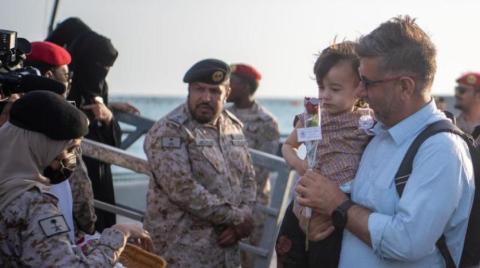
The boy looked puzzled as he turned around an orange inspecting it with his small hands to try to put it into his pocket, and when he failed to hide it under his shirt, he took it out to smell it and then tried to hide it again.
The boy was sitting in a clinic in the countryside of Damascus alongside his mother and his tired grandfather. One of the people in the waiting room tried to play with the him by asking for a piece of the orange. The child asked him in surprise: "Do you know what this is?” and then sat closer to his mother.
The mother was motionless and tried to explain to the man: "We were in al-Ghouta and yesterday was the first time he saw an orange.”
Silence prevailed over the place as the grandfather was holding back his tears, and he recounted to his companions their suffering in Ghouta, especially during the last year.
“We spent 10 unforgettable days,” he said, adding: “Bodies were clustered beside each other. Old people moaned in agony and children cried. Everybody was hungry. Some even lost their minds.”
It seemed that the grandfather wasn’t able to convince his brother-in-law to go to Damascus, as did a number of relatives, who chose to settle their status and join the ranks of the regime forces for the mandatory service.
“Were the young people who chose to settle their situation allowed back in Damascus?” asked one of the people in the waiting room, to which the grandfather replied explaining that they are still being held.
“Men aged 16 to 50 are not allowed to leave their places of detention in the shelters until they know whether they are wanted for mandatory service or reserve," he said, adding: "It is a tough choice, but it is clear. The war is ending and the destiny of those going to Idlib is unknown.”
The grandfather then voiced his conviction that the big battle in Idlib will happen sooner or later, and what happened in al-Ghouta and before it in Aleppo will take place in Idlib.
The 60-year-old grandfather looked twenty years older than his actual age, talking softly and sadly, leaning his thin body on the chair, with his pale face and long white beard telling a long tragedy.
He lost many members of his family and his brothers’ family during the last four years in al-Ghouta.
"Losing my loved ones broke me. Our houses were destroyed and our farms burned. Everything is lost and our only hope is God," he stated.
He was hoping that his son and son-in-law would be persuaded to go out to the regime-controlled areas, saying in war you are either a winner or a defeated.
He pointed out that he was forced to come with the women "daughters and daughters-in-law, some of which are widows with more than ten children aged between one and 14 years old, all of which need treatment after years of siege, hunger and fear.
“I will not let them go to Idlib to die there,” exclaimed the grandfather saying that they have relatives in Damascus who would not abandon them.
Al-Rahman Corps announced a ceasefire in the area after signing an agreement with Russia. It indicated in an official statement that the purpose of the agreement, which entered into effect on the night of March 22-23, 2018, is to evacuate the Corps operatives to northern Syria.
“Due to the major escalation … an agreement has been reached after direct negotiations with the Russians,” said a spokesman for the corps.
According to sources in Damascus, about 135,000 civilian left cities of eastern Ghouta and arrived at accommodation centers in Ariha and Maarrat al-Numan in Idlib.












